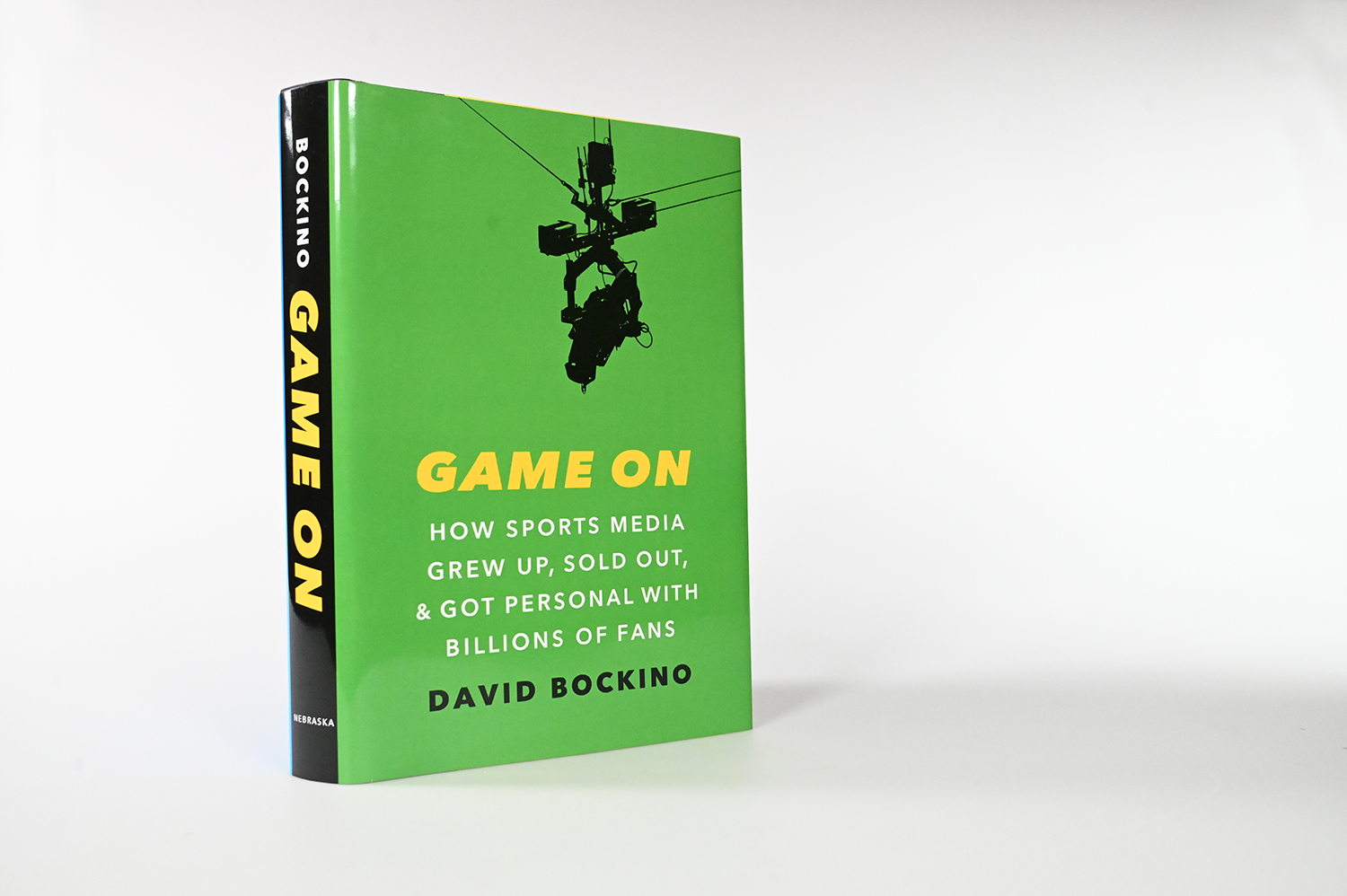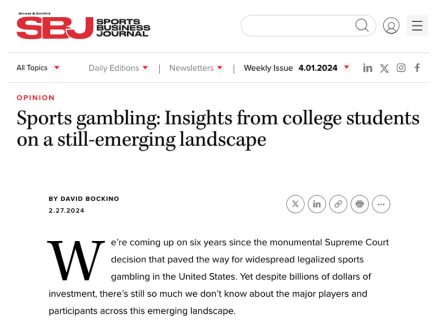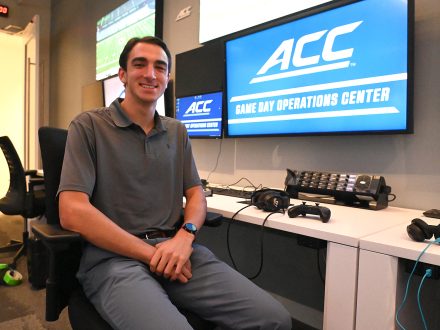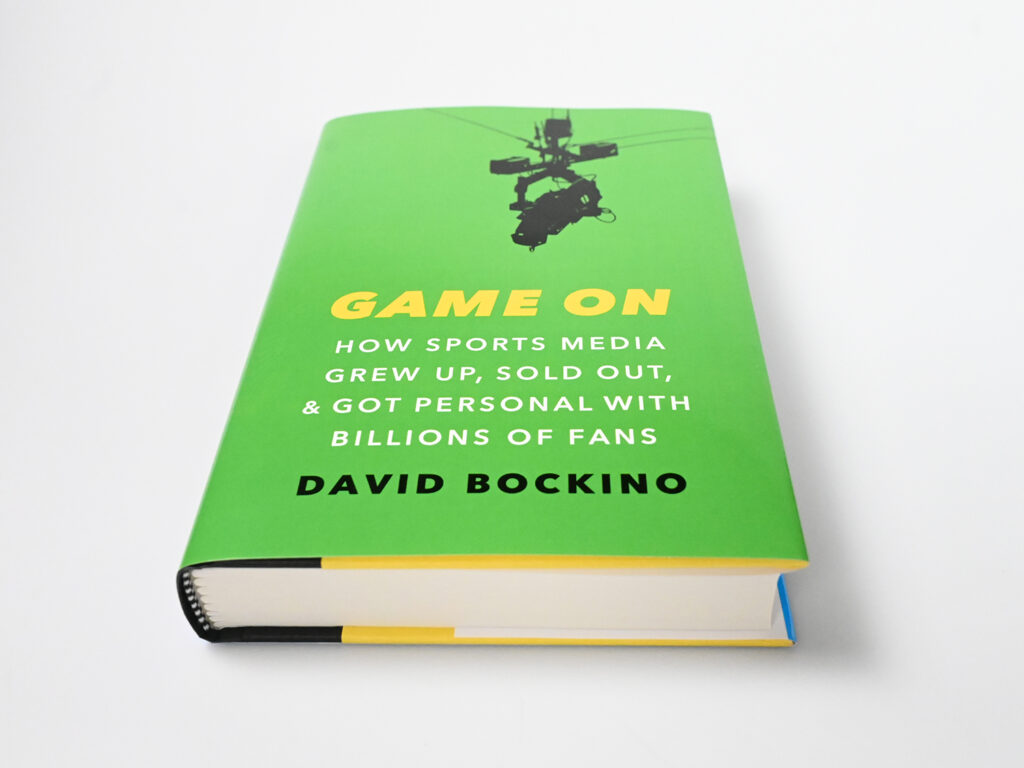Bocchino's book (published April 1), titled “Game On: How Sports Media Grew, Sold Out, and Got Closer to Billions of Fans,” This is the industry's first comprehensive history for general readers.

Sports is a results-based industry measured in wins, losses, and statistics.
So it makes sense to evaluate the first year of Elon University's Sports Media Lab in a similar way, and the metrics look good.

Since the lab's launch in September, the first batch of students, led by sports management associate professor David Bocchino, has actively embraced opportunities and avenues to pursue sports media-related research questions. His five students and faculty advisors at Elon considered topics such as sports gambling, fantasy sports, player/team content creation, broadcast innovation, and the perceived value of streaming services.
Supported by an Elon Innovation Council grant, the lab has provided a structure for students, faculty, and sports industry partners to workshop new ideas for related research and find ways to make them a reality. Ta. The purpose of this lab is simple. To make Elon an industry leader in sports media research.
“This is an exciting first year for the Sports Media Lab, providing students with a cohort-based undergraduate research experience that supports their curiosity in sports media,” Bocchino said. “And we feel fortunate to have found a partner who is enthusiastic about collaborating with us and expanding our research.”
The lab had an active first year investigating college students' sports media habits, including multiple focus group sessions in November and March. The first focus group addressed sports gambling and player/team content creation, and the second group explored perceptions and values of sports streaming services and content piracy.

The institute published a Sports Business Journal editorial titled “Sports Betting: Insights from College Students on an Emerging Situation” in February, based on focus group discussions, interviews and surveys. . The institute also received media attention in the days after North Carolina launched statewide sports betting in March. Bocchino has been featured in several media interviews, including an extended appearance on his CBS affiliate WFMY in Greensboro.
All five Sports Media Lab participants worked on individual research topics in addition to their cohort experience. Topics range from how European soccer clubs market their teams to American audiences, to the unifying aspects of sports viewing among international students on college campuses, to how different groups perceive the value of NFL players. There was a wide range of squid.
Elliott Rezek ’24, a media analysis and computer science double major, used eye-tracking software this year to study viewer affinity for new camera angles on NFL broadcasts. He worked closely with strategic communication professor Qian Xu to delve into this topic, trying to identify whether viewers' camera angle preferences are based on how familiar the viewers are with the sport.
“I was initially drawn to this lab because it combined my two main interests: academic research and sports,” he said. “As a non-sports management major, this was a great way for me to learn about sports in a way that I don't often get in other classes.”
Rezek credits Xu and Bockino with pushing him to strengthen the parameters of his projects, expand his skillset, and seek out experiences for personal growth. This includes an oral presentation scheduled for April at the National Conference on Undergraduate Research (NCUR) in Long Beach, California.
“Well, I'm not going to lie. It's pretty scary presenting at NCUR,” Rezek said jokingly. “I've never done anything like this before. But I've worked hard to get this far with my research, so I'm very excited. I'd like to present the results and what I learned through the process.” Dr. Bocchino encouraged me to present at NCUR because he knew it would push me outside of my comfort zone, which made him a great mentor. I am doing it.”

Anthony Bamford ’25, a media analysis major, echoed Rezek’s sentiments and pointed out the benefits of working with Bocchino. Together, students and mentors partnered with the Atlantic Coast Conference to investigate the variables behind college football game times. Bamford was recently accepted into Elon's SURE program to continue this research and ultimately present his findings to the ACC.
“Dr. Bocchino is very good at asking questions that push me to think critically, not only about the topic at hand, but also about how external factors influence my research.” said Bamford, who completed his internship at ACC last fall. “His guidance has been critical in narrowing the scope of the project over the past year.”
The latest news from Sports Media Lab is the April 1 publication of Bocchino's new book, “Game On: How Sports Media Grew Up, Sold Out, and Get Personal with Billions of Fans.”
Published by the University of Nebraska Press, this book is the first to comprehensively examine the evolution of the sports media industry, noting that increased personalization of content (i.e., social media, fantasy sports, gambling) suggests a stark contrast to the focus of About collective experience. This text delves into what a key element of this evolution, the introduction of widespread legalized gambling, means for fans, sports teams and leagues, and society as a whole.
Bocchino said the idea for his new publication goes back to his winter semester course Through the Lens of ESPN, which explores the intersection of sports, media and culture. His past courses have taken him to Argentina, Brazil, Spain and Uruguay.
“During this class, I thought it would be great to have a comprehensive overview of the history of sports media. So I wrote a book.”
– David Bocchino
Bocchino's text provides the necessary historical context, pointing out that, thanks to radio and television broadcasts, sport was primarily a shared experience enjoyed with others, and at the same time enjoyed. . But since ESPN's launch in 1979, which Bocchino called a “tipping point” in sports media consumption, sports fans have become increasingly fragmented.
“From talk radio to fantasy sports, video games, and now widespread sports gambling, fans are increasingly in control of what they watch, who they watch, and who they root for. “We're working hard,” Bocchino said. “This book discusses the idea of personalizing the sports fan experience and whether it's a good thing for society as we move further into an overall self-centered media experience.”
The school year is coming to an end, but Bocchino and the Sports Media Lab are already looking ahead to next year. The lab has already secured a partnership with Charlotte FC, where students will pursue research projects developed in collaboration with the Major League Soccer team. It's a collaboration Bocchino is looking forward to, and one he envisioned when he first started the lab.
“An essential element of the Sports Media Lab is our mutually beneficial relationships with our partners in the sports industry,” Bocchino said. “We are really looking forward to starting our partnership with Charlotte FC this fall and expect this relationship to be beneficial to them and to us. We continue to look for additional partners interested in researching these trends.”


